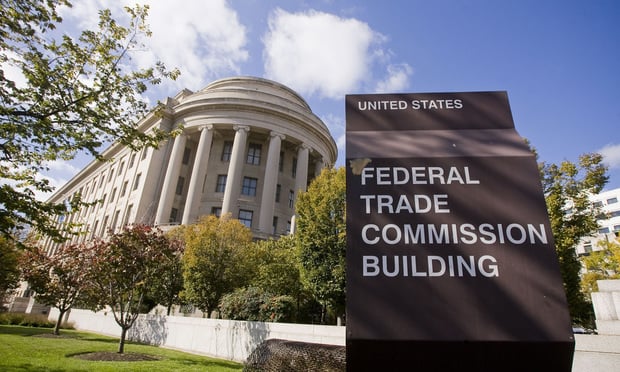Two Georgia Companies Settle FTC Misrepresentation-Ad Claims Over Zika Prevention
The U.S. Federal Trade Commission's recent settlement with two Georgia companies over allegations of misrepresentation in a media campaign provides some important takeaways for the advertising and public relations firms businesses hire.
November 19, 2018 at 04:11 PM
4 minute read
The original version of this story was published on Corporate Counsel
 U.S. Federal Trade Commission building. Photo: Diego M. Radzinschi/ALM
U.S. Federal Trade Commission building. Photo: Diego M. Radzinschi/ALM
The U.S. Federal Trade Commission's recent settlement with two Georgia companies over allegations of misrepresentation in a media campaign promoting mosquito repellent to combat the Zika virus during the 2016 Rio Olympics provides some important takeaways for advertising and public relations firms.
The federal agency earlier this month announced that Atlanta-based public relations firm Creaxion Corp. and Inside Publications, publisher of Inside Gymnastics magazine, misrepresented that paid endorsements were independent consumer opinions and commercial advertising was independent journalistic content, according to the statement announcing the settlement. The companies' principals, Mark Pettit and Christopher Korotky, respectively, also were named in the action.
According to the complaint, two Olympic gold medalists engaged as endorsers by the companies posted social media endorsements for the repellent without disclosing they were paid, and the magazine reposted the endorsements, again without disclosure of the payment. In addition, according to the FTC, Inside Gymnastics ran ads for the product that were disguised as feature or other articles, while Creaxion and Pettit reimbursed employees for buying the product and posting online reviews.
Neither Pettit nor Korotky immediately returned a LinkedIn and email message, respectively, seeking comment about the allegations or settlement.
As part of the proposed FTC order, the companies and their principals are prohibited from making such misrepresentations going forward and must disclose material connections with, and otherwise monitor, any endorsers they engage, according to the news statement.
The agreement is significant, legal experts said, as a strong indication that the FTC guidelines governing product endorsements extend well beyond the product's manufacturer.
“This is a public reminder to ad agencies and publishers that the FTC is aware of the material role they can play in the development of content, and a message that 'We can hold you accountable too if you're integrally involved in developing the promotional strategy for products,” said Raqiyyah Pippins, counsel at Arnold & Porter Kaye Scholer.
She added that the FTC is more likely to pursue enforcement when the allegations concern issues related to public health as in this case.
The case also demonstrates the problem on the part of companies of devoting a portion of their website to consumer product reviews. If companies are giving any sort of emolument, even something as small as a free product, in exchange for an online review, that fact must be “prominently disclosed” on the site, said Larry Weinstein, a litigation partner and co-head of the false advertising and trademark group at Proskauer Rose.
In an email, Tami Carmichael, a partner at Olshan Frome Wolosky, added that for industry agencies and PR firms, the case highlights the “importance of having and implementing up-to-date branding and social media guidelines that clearly set forth influencer's and endorser's disclosure obligations.”
Such lessons certainly extend to the advertiser-companies themselves, said Amy Lally, a litigation partner at Sidley Austin. For starters, she said, companies and their legal departments must strongly prioritize compliance with all laws, including sponsorship laws, in their contracts with marketing firms, endorsers and influencers. But before those contracts are signed, Lally added, businesses should develop a process for vetting those marketing firms.
“If you're going to have these good, strong contracts, then review some of the work product of your marketing partners to see whether in past work they have adhered to your high standard or what your would-be strong contract language would be,” she said.
This content has been archived. It is available through our partners, LexisNexis® and Bloomberg Law.
To view this content, please continue to their sites.
Not a Lexis Subscriber?
Subscribe Now
Not a Bloomberg Law Subscriber?
Subscribe Now
NOT FOR REPRINT
© 2025 ALM Global, LLC, All Rights Reserved. Request academic re-use from www.copyright.com. All other uses, submit a request to [email protected]. For more information visit Asset & Logo Licensing.
You Might Like
View All

Ex-Prosecutor’s Trial Ends as Judge Throws Out Her Felony Indictment in Ahmaud Arbery Death Case


Ex-Prosecutor Denies on Witness Stand That She Tried to Protect Ahmaud Arbery's Killers
Trending Stories
- 1Meet the Former NFL Player Now Back at Vinson & Elkins
- 2Inside Track: Cooley's Modest Proposal to Make Executives Safer
- 3Justified Termination Does Not Bar Associate Attorney From Unemployment Benefits, State Appellate Court Rules
- 4Effective Termination Strategies in Today’s Troubled Condo Market
- 5AI and Land Use—a Perfect Match in Real Estate Heaven
Who Got The Work
J. Brugh Lower of Gibbons has entered an appearance for industrial equipment supplier Devco Corporation in a pending trademark infringement lawsuit. The suit, accusing the defendant of selling knock-off Graco products, was filed Dec. 18 in New Jersey District Court by Rivkin Radler on behalf of Graco Inc. and Graco Minnesota. The case, assigned to U.S. District Judge Zahid N. Quraishi, is 3:24-cv-11294, Graco Inc. et al v. Devco Corporation.
Who Got The Work
Rebecca Maller-Stein and Kent A. Yalowitz of Arnold & Porter Kaye Scholer have entered their appearances for Hanaco Venture Capital and its executives, Lior Prosor and David Frankel, in a pending securities lawsuit. The action, filed on Dec. 24 in New York Southern District Court by Zell, Aron & Co. on behalf of Goldeneye Advisors, accuses the defendants of negligently and fraudulently managing the plaintiff's $1 million investment. The case, assigned to U.S. District Judge Vernon S. Broderick, is 1:24-cv-09918, Goldeneye Advisors, LLC v. Hanaco Venture Capital, Ltd. et al.
Who Got The Work
Attorneys from A&O Shearman has stepped in as defense counsel for Toronto-Dominion Bank and other defendants in a pending securities class action. The suit, filed Dec. 11 in New York Southern District Court by Bleichmar Fonti & Auld, accuses the defendants of concealing the bank's 'pervasive' deficiencies in regards to its compliance with the Bank Secrecy Act and the quality of its anti-money laundering controls. The case, assigned to U.S. District Judge Arun Subramanian, is 1:24-cv-09445, Gonzalez v. The Toronto-Dominion Bank et al.
Who Got The Work
Crown Castle International, a Pennsylvania company providing shared communications infrastructure, has turned to Luke D. Wolf of Gordon Rees Scully Mansukhani to fend off a pending breach-of-contract lawsuit. The court action, filed Nov. 25 in Michigan Eastern District Court by Hooper Hathaway PC on behalf of The Town Residences LLC, accuses Crown Castle of failing to transfer approximately $30,000 in utility payments from T-Mobile in breach of a roof-top lease and assignment agreement. The case, assigned to U.S. District Judge Susan K. Declercq, is 2:24-cv-13131, The Town Residences LLC v. T-Mobile US, Inc. et al.
Who Got The Work
Wilfred P. Coronato and Daniel M. Schwartz of McCarter & English have stepped in as defense counsel to Electrolux Home Products Inc. in a pending product liability lawsuit. The court action, filed Nov. 26 in New York Eastern District Court by Poulos Lopiccolo PC and Nagel Rice LLP on behalf of David Stern, alleges that the defendant's refrigerators’ drawers and shelving repeatedly break and fall apart within months after purchase. The case, assigned to U.S. District Judge Joan M. Azrack, is 2:24-cv-08204, Stern v. Electrolux Home Products, Inc.
Featured Firms
Law Offices of Gary Martin Hays & Associates, P.C.
(470) 294-1674
Law Offices of Mark E. Salomone
(857) 444-6468
Smith & Hassler
(713) 739-1250






